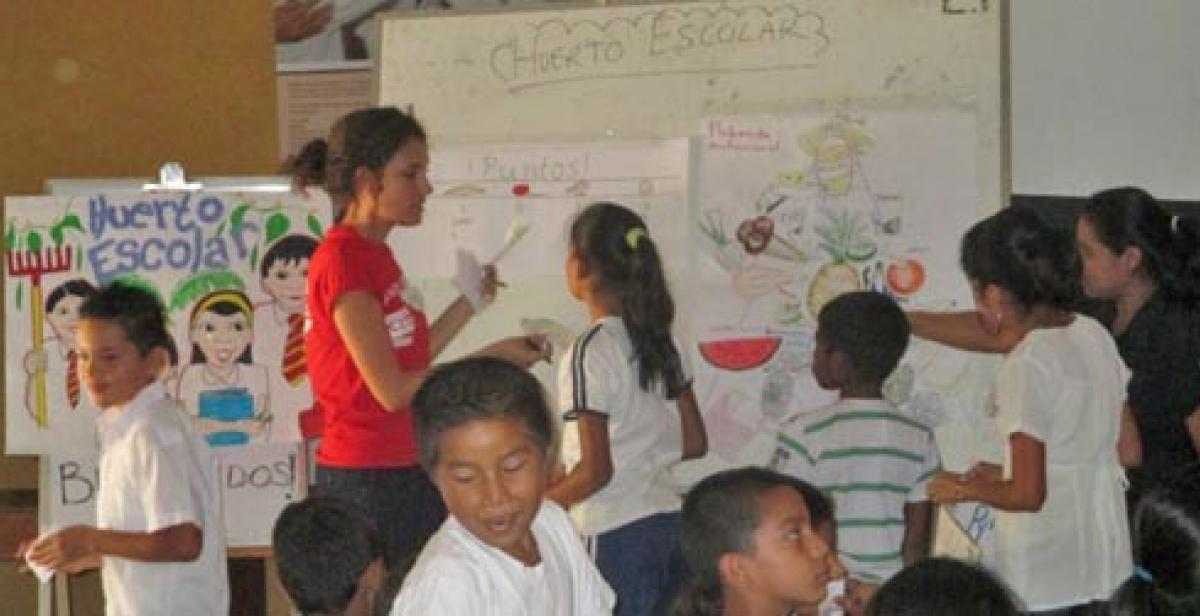Food safety, security and nutrition are serious issues in the developing world. Nicaragua is classed as the second poorest country in the western hemisphere with figures from the UN Food and agriculture agency stating that 27% of the population suffers from malnutrition.
Starting a vegetable garden project with the local school in Mozonte and educating the children about nutrition is something we as a group felt very passionate about. From speaking with the local people we have found out about the diets of the local population. We have discovered that meals and diets lack a variation in different food types and nutrients. The average Nicaraguan diet is predominately focused on carbohydrates with a lack of protein, meaning that many people do not consume enough calories to sustain a healthy lifestyle.
Hunger and malnutrition appear to be serious problems amongst indigenous people and women and children living in remote, rural communities. There is evidence to show that there is a link between lack of formal education and malnutrition. Mothers who lack formal education are far more likely to give birth to a baby of lower birth weight. Lack of access to safe drinking water has an effect on malnutrition levels. People in rural areas of Nicaragua are most at risk of not having a safe drinking water supply. This lack of access can lead to disease with diarrhea being a major cause of malnutrition and undernourishment.
Last week we delivered a workshop to local school children. The aims of the workshop were to assess the existing knowledge of the school children on health and nutrition matters and to educate and inform the children on having a balanced diet. It was great fun to quiz and play educational games with the kids and this proved to be a good way to find out existing nutritional knowledge. Many of the children did not know that eating different types of fruits and vegetables is a good way to maintain health, with many children thinking vegetables were not important as part of a balanced diet. There is a general lack of consumption of fruit and vegetables amongst the population in Nicaragua with widespread vitamin and mineral deficiencies; this problem is only worsening due to the growing trend in snack food consumption.
In order to start work on the vegetable garden we are going to be preparing a land plot. This will be a great opportunity to get involved in some practical work. We are developing a composting project with the school to help aid and increase soil fertility of the vegetable garden land plot. We have given a workshop on composting and recycling.
Together as a group we were able to tell the students about compostable materials, how to make compost and what roles insects play in the development of compost. A plan has been outlined with the school to create a compost bin with students, in the hope that students will develop an understanding of how to make compost and the benefits it can have to the fertility of soil and therefore productivity of the land.
The creation of the vegetable garden project will hopefully inspire the students and create an interest in nutrition, giving the students a desire to grow vegetables at home. Educating children on nutritional matters will hopefully be a good way to convey information about nutrition to parents. In order to help improve the problem of malnutrition in Nicaragua the government is introducing schemes to reduce malnutrition. Farmers are being incentivized to grow more grain and some free school meals have been introduced to address the issue of child malnutrition. Programmes have also been implemented in rural areas to reduce malnutrition in children under 3.
Blog by Laura Savage
Photo: Nayana helping to deliver a nutrition workshop




Comments
Thank you Laura for your blog
Thank you Laura for your blog which I found very informative aand insightful. You are all doing valuable work as a group aand is sure going to change your lives for the better! Well done Progressio Nicaragua!